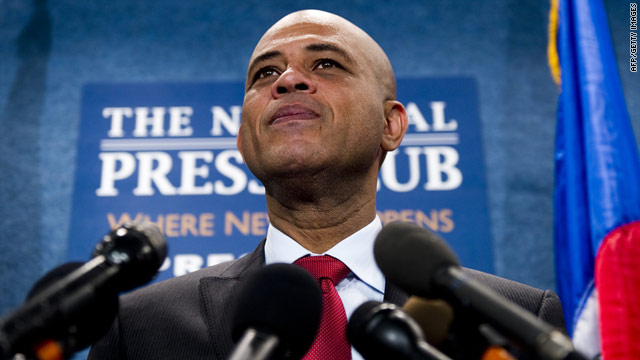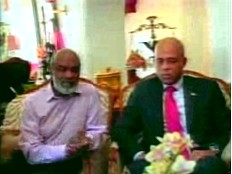Publié le 18 avril 2011 à 07h08 | Mis à jour à 11h10
Le nouveau président d'Haïti, Michel Martelly, ne prendra pas de décisions précipitées dans le cas des anciens présidents Jean-Claude Duvalier et Jean-Bertrand Aristide, mais il songe à leur accorder une amnistie dans le but, dit-il, de favoriser le processus de réconciliation dans son pays durement éprouvé.
 Dans une entrevue exclusive à La Presse, via Skype, le populaire chanteur qui deviendra officiellement président dans les prochains jours, dit avoir un «plan pour l'avenir, pas pour le passé», tout en précisant qu'il respecte la douleur des victimes de ces régimes.
Dans une entrevue exclusive à La Presse, via Skype, le populaire chanteur qui deviendra officiellement président dans les prochains jours, dit avoir un «plan pour l'avenir, pas pour le passé», tout en précisant qu'il respecte la douleur des victimes de ces régimes. Cette position risque de faire des remous, en particulier auprès des centaines de Québécois d'origine haïtienne qui ont dû fuir leur pays pendant les années Bébé Doc (de 1971 à 1986), le plus souvent après avoir été arrêtés, torturés, menacés. Ces gens s'organisent pour faire condamner l'ancien dictateur, une démarche soutenue, notamment, par l'organisme Human Rights Watch.
On accuse Jean-Claude Duvalier d'être responsable de milliers de morts et de disparitions. À son retour à Port-au-Prince, en janvier, il a été accusé formellement de corruption et de détournement de fonds. Il a toutefois été relâché.
En entrevue, le président Martelly promet par ailleurs de mettre fin à des décennies de corruption et de gaspillage pour redonner confiance à son peuple et à la communauté internationale.
Il appelle en outre la diaspora haïtienne à revoir sa relation avec la mère patrie et reconnaît que les dirigeants de son pays ont cruellement manqué à leurs obligations dans le passé.
Voici, en blocs distincts, résumant les immenses défis qui se dressent devant Haïti, les réponses, le plan et la vision de son nouveau président.
1. Reconstruire le pays
Avant le tremblement de terre de janvier 2010, Haïti représentait déjà un défi incommensurable. Alors, maintenant, avec la dévastation en plus, peut-on encore y croire? Par où commencer?
«Les priorités sont multiples, reprend M. Martelly. On parle d'éducation, de relocalisation de ceux qui vivent sous les tentes, de la relance agricole, de la faim, de la crise alimentaire, de l'accès inexistant à la santé...
«Pour moi, le plus important, c'est de parler de la confiance qui n'existe plus entre la population et l'État et avec les partenaires d'Haïti. Il est impératif de rétablir cette confiance de telle sorte que l'on donne courage et force à la population. Redonner aussi confiance aux amis et partenaires d'Haïti parce que ça fait longtemps qu'ils se penchent sur la cause haïtienne et, malgré tout, on tarde à voir des résultats. On se demande même si c'est fait exprès. Et finalement on a réalisé que c'est le leadership haïtien qui n'a jamais donné la priorité aux intérêts d'Haïti, qui n'a jamais voulu donner ce développement durable, ce qui fait que l'on doit aujourd'hui vivre d'assistanat.»
Et que dites-vous aux Québécois qui pensent que ça ne vaut plus la peine de donner de l'argent à Haïti, que c'est un trou sans fond?
«D'abord, je leur dis merci d'avoir essayé, d'avoir fait ça avec leur coeur. Je connais bien l'amour que les Québécois et les Canadiens ont pour Haïti et je comprends aussi leur déception, parce qu'ils voudraient tous voir Haïti changer un jour.
«Je veux leur dire qu'Haïti va changer.
«Je veux voir Haïti progresser et non plus seulement collecter de l'argent. Cela m'intéresse beaucoup plus d'inviter les partenaires à faire des dons d'infrastructures, des hôpitaux, des centres de santé, des bibliothèques, de la machinerie agricole et mettre sur pied une structure de contrôle. Je suis beaucoup moins pour l'argent que pour les résultats.»
«On apporte une garantie: nous avons la bonne volonté. Sous ma présidence, la corruption ne sera pas de mise (...). Je vous garantis des résultats.»
2. Reprendre sa place et ses responsabilités
Qui doit diriger le colossal effort de reconstruction? La communauté internationale, Bill Clinton, le gouvernement haïtien?
«C'est le gouvernement haïtien qui doit mener, qui doit prendre sa place dans la reconstruction. Haïti est un pays libre et indépendant et a un président fraîchement élu. Il s'agit de donner la priorité aux besoins de la population.
«Il y a eu des doutes par le passé et parfois, par manque de confiance, on a même décidé pour Haïti. L'opinion des Haïtiens n'a pas toujours compté. Même au sein de la CIRH (Commission intérimaire pour la reconstruction d'Haïti), la représentation haïtienne était presque inexistante. Les projets sont choisis par la partie étrangère. Les Haïtiens ont été le problème par le passé, mais maintenant c'est une nouvelle approche. On est conscients d'être allés à reculons.»
3. Trop d'ONG, trop peu de surveillance
«La communauté internationale a tout essayé pour aider Haïti, mais malheureusement, la corruption, le manque de transparence, le manque de cadre. Ça n'a pas toujours marché, ce qui a donné naissance à cette vague d'ONG qui sont sur le terrain et qui reçoivent beaucoup plus d'argent que l'État haïtien.
«Ce qui fait que les institutions sont faibles et que les ONG ont beaucoup d'argent. Malheureusement, elles ne répondent à personne, on ne leur pose pas de questions et elles agissent comme elles lde veulent dans n'importe quelle zone. Il faudrait blâmer l'État parce qu'il autorise les ONG. L'État aurait pu au moins superviser ces ONG et s'assurer qu'elles oeuvrent dans des endroits bien précis et que leurs programmes intègrent un plan national. Je blâme le leadership haïtien et le manque de volonté et de transparence. Cela va changer dès que nous serons installés.»
4. Les cas Bébé Doc et Aristide
Que faire des anciens présidents Jean-Claude Duvalier et Jean-Bertrand Aristide récemment rentrés au pays, ravivant de douloureux souvenirs dans la population en plus de soulever des questions juridiques cruciales? Doit-on les arrêter et les juger pour les exactions et les fraudes commises sous leur présidence?
«Leur cas n'est pas aussi particulier que vous le pensez. La Constitution d'Haïti ne prévoit pas l'exil. Alors, ils sont bel et bien chez eux et je leur dis bienvenue. S'ils ont eu des problèmes ou s'ils ont mal agi par le passé, cela a à voir avec la justice.
«Je leur dis bienvenue et nous prônons la réconciliation et l'inclusion. Il ne s'agit pas de prôner l'idéologie. Mon gouvernement a un plan pour l'avenir. J'ai toujours évité de planifier sur le passé. Je dirais tout simplement que nous pourrons éventuellement penser à ça (l'amnistie) dans la mesure où ceux qui ont été blessés dans le passé comprennent la nécessité de se réconcilier. Avant de penser à ça, il faut faire un travail de sensibilisation et de réconfort pour comprendre les victimes et respecter leurs sentiments.
«Donc, on ne s'empressera pas de prendre des décisions, mais la tendance veut que je penche du côté de l'amnistie et de la clémence, de sorte que l'on puisse penser à demain et non pas au passé. Mais il faudra toujours tenir en compte du passé pour ne pas répéter les erreurs.»
5. Un nouveau rôle pour la diaspora
«La diaspora haïtienne envoie plus de 1 milliard et demi par année à des proches restés au pays. Un «apport considérable», mais mal dirigé et peu efficace.
«Cet argent arrive à coups de 100$ par personne ou 200$ par semaine. Il n'est pas utilisé pour des projets qui apporteraient le développement durable dans certaines villes. Je propose de créer une équipe qui prendra contact avec la diaspora, représentée elle aussi par une équipe, et ces deux équipes pourront travailler ensemble à des projets qui apporteraient du développement durable.
«La diaspora a un rôle à jouer. Elle doit revenir chez elle. Elle a eu peur de revenir à cause de l'insécurité. Le premier rôle serait d'être les premiers touristes, dont on a tellement besoin. Elle pourrait donner l'exemple. Elle pourrait aussi venir avec des projets solides qui puissent faire une différence. Il ne s'agit pas de payer l'écolage (NDLR: droits de scolarité) des petits ou d'envoyer 100$ pour la mangeaille.
«Parce qu'à ce moment-là, on ne voit pas les faits de cet apport. Je suggère que cette diaspora se constitue en force et que cela donne quelque chose de tangible.»
6. Message au prochain premier ministre canadien
«Il y a toujours eu une histoire d'amour entre Haïti et le Canada et je souhaite que le prochain premier ministre s'assure que les relations restent les meilleures. Je vous dis en plus merci pour toute l'assistance que votre pays a apportée par le passé et nous allons travailler à ce que vous ne regrettiez plus d'avoir fait tous ces efforts pour Haïti.»
 PORT-AU-PRINCE, Haiti (AP) — Haiti's president-elect announced Tuesday that he intends to impose taxes on money transfers and international cellphone calls to help finance schools across the chronically impoverished country.
PORT-AU-PRINCE, Haiti (AP) — Haiti's president-elect announced Tuesday that he intends to impose taxes on money transfers and international cellphone calls to help finance schools across the chronically impoverished country.






